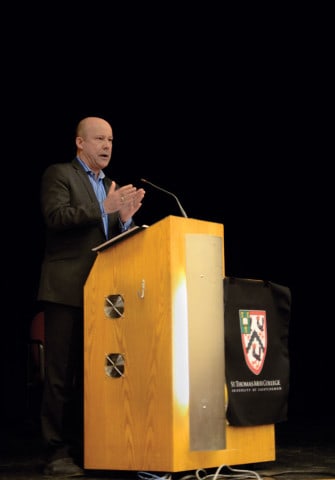It was a full house at the Father O’Donnell auditorium at St. Thomas More College on March 25 as students and staff witnessed a head-to-head live debate on the constitutional right to strike in Canada.
The debate involved John Gormley of News Talk 650 CKOM and University of Saskatchewan assistant-professor of political studies Charles Smith.
On Jan. 30, the Supreme Court of Canada ruled in favour of the Saskatchewan Federation of Labour when they constitutionalized labour unions’ right to strike. This means that alongside the right to human dignity, equality, liberty, freedom of the press, respect for the autonomy of the person and enhancement of democracy, among other fundamental human rights, now falls labour unions’ right to strike.
The question being debated was whether the Supreme Court of Canada got it right. Smith believes they did.
“In SFL versus Saskatchewan, the Supreme Court of Canada said that The Freedom of Association protects a meaningful process of collective bargaining and the right to strike and it reinforced the notion, and I quote, that ‘the judicial arc with regards to workers’ rights was bending increasingly towards workplace justice,’” said Smith. “Those eloquent words were written by Justice Abella for the majority in the Supreme Court of Canada and I think that conclusion was correct.”
Smith has a bachelor of arts degree from the University of Northern British Columbia and a master of arts degree and doctorate from York University. Smith has written and published a great deal of literature regarding the role of unions and labour laws in Canada.
Daphne Taras, dean of Edwards School of Business, acted as the moderator for the debate. Smith’s opponent, Gormley is a former Saskatchewan Member of Parliament,  graduate of the U of S College of Law and a member of the Queen’s Counsel.
graduate of the U of S College of Law and a member of the Queen’s Counsel.
Before outlining his argument, Gormley thanked Smith for organizing the debate.
“One of my signs of the coming apocalypse is a society that believes you can debate in 140 characters on social media, so I delight in this opportunity today,” Gormley said.
Despite their friendly banter, Gormley disagrees with Smith for the most part.
“This is a significant and an important win for organized labour, in fact it is a game-changer for labour relations in Canada,” Gormley said. “I just think it’s wrong.”
Smith presents his position as one that is against unilateral decision-making, which he argues has occurred in the past. He supports the need for reasonable dialogue between labourers and employers, which he argues is what the newly constitutionalized right now demands.
“In 2007… the government attempted to erode the basic ability of workers to bargain conditions at work through the imposition of Bill 5, the Public Sector of Service Essential Services Act,” Smith said. “The declaration of essential was incredibly sweeping, included no appeal mechanism for the unions involved. You were essential if the government said you’re essential.”
Smith proceeded to provide details of the history of the politics behind such a decision and wrapped up his 10-minute argument by reiterating his support of the Supreme Court’s judgment.
“This was too broad and too sweeping and in coming to conclusion the court struck down the act, giving the government a year to revise the bill,” Smith said. The court “did not declare a stand alone right to strike, it was tied to a process of discussion, a process of discourse, a process of reasonable dialogue.”
Gormley came to refute Smith’s claims however, outlining his rebuttal in three overarching themes: the practical consequence of the court’s decision, the policy implications and how it affects the state of law in Canada.
Gormley compared the court’s decision to other constitutional human rights.
“Expect labourers to challenge any limit to related strike activity… If a right to strike is a fundamental freedom, nobody expects you to give 48 hours if you are not going to go to church, or 48 hours to speak to somebody your point of view, so why, then, could you possibly tell someone why or how they are going to go on strike?”
On a policy level, Gormley revealed how fundamental freedoms normally apply to all Canadians, yet this particular right only applies to the percentage of the population who are part of a labour union which Gormley argues is only 30 per cent of Canadians at most.